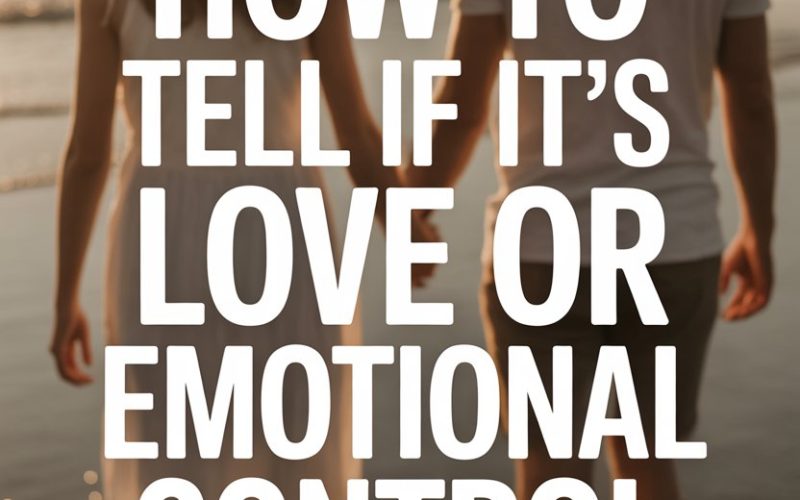Ever found yourself lying awake, phone in hand, replaying a conversation with your partner and wondering: Is this deep, devoted love, or am I being steered like a remote-control car with questionable battery life?
Busy parents juggle enough—nappies, deadlines, and the never-ending quest to find both shoes—without sorting through emotional puzzles at midnight.
But untangling love from emotional control matters. Not just for you, but for the little people who look up to you.
Here’s what to notice, what to do, and how to reclaim the relationship dynamic you deserve—even if your only “alone time” is hiding in the pantry with a biscuit.
The Difference Between Love and Emotional Control
Genuine love feels like a warm cuppa after a long day. There’s comfort, safety, space to breathe, and a sense that you’re truly seen—even when your hair resembles a windblown dandelion.
Emotional control? Imagine a thermostat you never set, but someone else keeps turning it up or down depending on their mood.
The trickiest part: emotional control masquerades as love.
It might sound like, “I just want what’s best for you,” or, “I get worried when you go out without me.” It’s devotion… until it’s not.
Spotting the Red Flags in Everyday Life
Busy parents often brush off odd feelings. Who has time to overthink that snippy text when the toddler’s painting the cat again? Still, those little moments add up.
Does your partner keep tabs on where you are or who you’re with? Are you made to feel guilty for needing a bit of ‘me time’ (that is, if you can remember what that is)?
Notice patterns like these:
- You feel anxious or guilty when making simple decisions.
- What you want or need is regularly dismissed as ‘silly’ or ‘selfish.’
- Criticism comes disguised as concern: “Are you sure you want to wear that? It’s not really flattering.”
- Every disagreement leaves you feeling like you’re the problem.
If you’re nodding along, it’s not just you. Studies suggest subtle emotional control is more common than most want to admit (NIH).
The Subtle Art of Guilt Trips and Gaslighting
Not every controller is twirling a villainous moustache.
Sometimes it’s just “I guess I’ll put the kids to bed by myself. Again.” Or maybe, “I only said that because I love you so much.”
Gaslighting is the big one here. If you’re being told your feelings are ‘wrong’ or that you’re ‘too sensitive,’ your reality is getting rewritten for you.
Research into emotional manipulation shows it can be just as damaging as physical aggression.
Before you start doubting your memory or sanity, take stock. Are you apologising for things you never did? Do you find yourself explaining, defending, or justifying every choice, only to be told you’re wrong?
Classic control. Not classic romance.
Love Makes Room for You—Even the Flawed Bits
Here’s the heart of it: love welcomes your imperfections. Your partner isn’t supposed to be your editor-in-chief, red-pencilling your every sentence and sending you back for rewrites.
Real love says, “You’re knackered, you’re grumpy, and you forgot to put the bins out—again. I’m still here.”
When love turns into control, suddenly everything’s conditional. Affection, sex, and support are handed out as rewards—or withheld as punishment.
If you feel like you’re constantly earning your spot in the family photograph, something’s off.
A loving partner will say, “You look exhausted, go have a lie-down.” A controlling partner might sigh loudly, or point out how they’re never tired (because they’re obviously superhuman).
Setting Boundaries Without World War III
Ah, boundaries: the invisible electric fence of healthy relationships.
Often, a controlling partner reacts badly when you try to set limits. It might be a sulk, an argument, or a long speech about how they ‘just care so much.’
Try phrases like, “I need an hour to myself tonight, I’ll help with the dishes after.” If that request leads to drama or guilt-tripping, you’ve probably found the line between love and control.
If your partner respects your limits—even grumbling a bit—you’re probably dealing with love. If every boundary feels like a battle in a soap opera, it’s time to reassess.
Family therapist Nedra Glover Tawwab recommends practising small boundaries first, such as requesting time alone, before tackling bigger issues.
Your Children Are Watching
Even if you’re too busy to notice your own stress levels, kids have antennae tuned to the finest emotional frequency.
When they see one parent tiptoeing or constantly apologising, they learn what relationships look like.
Children who witness emotional control often internalise those patterns, which can echo into their own friendships and future romantic lives (Journal of Marriage and Family).
This isn’t meant to pile on guilt—just a gentle reminder that showing them what healthy love looks like is one of the best gifts you can give.
Sometimes, the courage to challenge controlling behaviour isn’t just for you. It’s for the next generation’s relationships, too.
It’s Not Just About Big Fights
Many parents think emotional control is about screaming matches or dramatic ultimatums.
More often, it’s a steady drip of little things. An eye roll when you speak. A sigh when you say you’re heading out with a friend. The tepid “Fine, do what you want” that doesn’t sound fine at all.
If you find yourself shrinking, second-guessing, or tiptoeing, those are clues. Love should feel like a safe pair of slippers, not a set of shoes two sizes too small.
When Love Gets Mixed Up With Responsibility
Parenting is a team sport (even if the other player sometimes forgets their jersey… or the game entirely). Love-based responsibility means sharing chores, picking up slack, and giving each other grace.
Emotional control, on the other hand, uses responsibility as leverage.
Ever been told, “If you really loved me, you’d…”? That’s not affection. That’s manipulation.
You’re not failing as a parent or a partner if you say no to unreasonable demands. You’re just refusing to play a game with moving goalposts.
What Healthy Love Actually Looks Like
Not sure what you’re aiming for? Try this checklist, courtesy of the Gottman Institute:
- A sense of safety, even during tough conversations.
- Freedom to have your own friends, interests, and opinions.
- Apologies that come without strings attached.
- Support when you’re struggling—not a tally of your mistakes.
- Affection that doesn’t have to be earned.
If you can tick most of these, you’re on the right track. A little squabbling about who left the milk out is normal. Feeling like you need permission to be yourself isn’t.
What You Can Do Tonight
You don’t need a grand intervention or a perfectly scripted confrontation. Try the smallest, simplest step:
- Notice your own feelings—are you tense, anxious, or always on alert?
- Share your thoughts with a trusted mate, sibling, or therapist. Sometimes just saying it out loud brings clarity.
- Practise one boundary, even if it’s tiny. “I’m going to bed early tonight” or “I’d like to have a cuppa by myself” counts.
- Watch your partner’s response. Respectful? Defensive? Dismissive? You’ll learn plenty.
And don’t forget—there’s no shame in seeking support. Relationship counselling isn’t just for dramatic TV couples. It’s for anyone who wants a happier, healthier family life (Relate UK).
Finding Your Voice Again
Often, emotional control silences the very best parts of you.
The confident you. The cheeky you. The you who remembers what it’s like to laugh until you snort.
Small choices, every day, add up.
Maybe you start listening to music you love, reconnect with old friends, or even wear those wild socks again. Each one is a step back toward yourself.
Your kids are watching—and you’re worth it.
When to Seek Help
If you’re feeling trapped, isolated, or fearful, don’t wait. There’s a world of support, and you’re not alone.
Trusted friends, family, and trained professionals can make a world of difference. Even a brief chat with your GP can point you to resources like Women’s Aid or Mind.
You deserve a relationship that lifts you up, not one that weighs you down.
Choosing Love Over Control
Parenting is tough enough without emotional power plays. Healthy love is possible—even if life feels like a chaotic jumble of lunchboxes and laundry.
Little steps matter. Boundaries, honest conversations, and a generous helping of self-compassion can help you reclaim joy, for you and your family.
And if you’re reading this while hiding in the loo, just know: you’re already showing the kind of self-love and courage that changes everything. Who says parents can’t be heroes?




